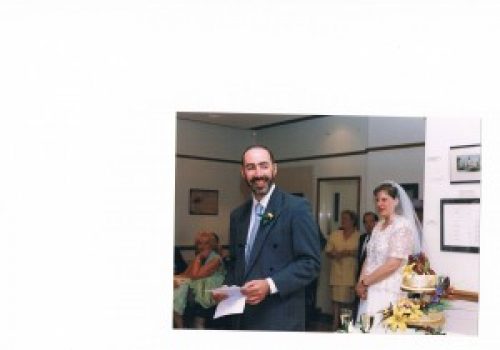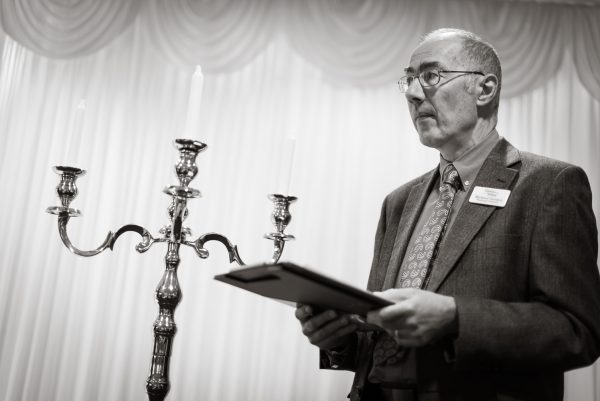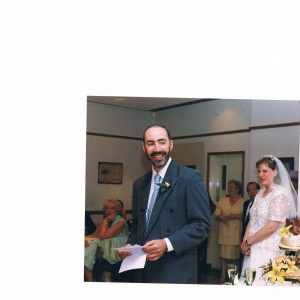
by Michael | Jul 9, 2018 | Blog
Weddings and public speaking go together. And stage-fright is often an (unwelcome) part of the process.
In fact, according to statistics, many people fear delivering a speech more than they fear death!
The likelihood is that you will be called upon to write and deliver a speech at least some time in your life. It may be for a business presentation or else for a family event. It could be in front of a handful of people or before a whole crowd. However, it is a skill that is well worth mastering.
My story
Only a few years ago, I needed persuasion before I would even enter a room to network. After a while, I became more comfortable. Then I was persuaded to give a 10-15 minute presentation about my business in front of 18 people. That was a step too far! I was so nervous that I gestured wildly and shattered a glass of water. I became memorable, but not at all for the right reasons!
Now, I willingly and confidently address small crowds (I haven’t got to the 1000s stage, but I hope that may happen). Recently, I was put in front of 200 guests at the Savoy, and it wasn’t an issue. Indeed, as a civil celebrant, my success depends, at least in part, on my presentation skills.
I’d therefore like to pass on knowledge and tips that I have acquired, so that the potential ordeal of public speaking can become much more palatable.
Focus
I am going to concentrate here on celebratory-type ceremonies. Essentially, we will need to focus on content and delivery. Here are some thoughts as a starting-point.
Tips
- It is better to be brief than over-long – your audience may be hot, tired, hungry
- If you can deliver humour successfully, do so; if not, keep those jokes to a minimum!
- Avoid too many “in-references” – at a wedding half the guests may not know anything about one of the newly-weds, so in-jokes can fall very flat and exclude whole groups
- Use a script or, better still, numbered 3 x 5″ cards. (Only very accomplished, experienced speakers can deliver off the cuff). Rehearse so that you can deliver your speech with only occasional reference to your notes. Eye contact with your audience is very important, if you are to engage with them
- There may be a good sound system, but ensure you can be heard loudly and clearly – you can help that by not burying your head in your notes and by speaking s-l-o-w-l-y ( a lot slower than you may expect!)
- Avoid saying anything controversial, whether about personalities in the room or about politics – the idea of the proceedings is to create a wonderful atmosphere, not to score points!
- Use anecdotes, but ones that fit in and are relevant. Avoid meandering ‘shaggy dog’ stories that may lose your audience. If you are not good at crafting a good story, maybe you can get someone to help you
- Delivery should be slower, rather than faster, and do not be afraid of a silence, if appropriate. Try not to address one area of the room only, but make everyone feel included
If you need any more advice, then there are professional presenters out there who can help. And I would be happy to help too.
Remember that it is a privilege to be asked to give a speech, so be grateful. Remember your audience at all times. Oh, and, however nervous you may be, save the alcohol for afterwards!
Enjoy the occasion.

by Michael | Apr 23, 2018 | Blog
For many people, the idea of death appeals more than the prospect of public-speaking!
The likelihood is that most people will be called upon to write and deliver a speech at least some time in their life. Possibly for a family event, like a wedding, or a business presentation. Discomfort (or worse) looms large, even if it’s only a question of presenting before a handful of people.
My credentials
Only a few years ago, before I became a civil celebrant, I was terrified at speaking in front of a dozen business-people. That’s not an issue any more. In fact, I can sincerely claim to have brought the house down on two occasions with a wedding speech; I now willingly and confidently address crowds of a couple of hundred (I haven’t got to the 1000s stage, but that am sure that would be fine).
Focus
In this piece I am going to concentrate on celebration ceremonies. Content is another matter, but for now I am going to cover delivery.
10 Tips
- It is better to be brief than over-long
- If you can deliver humour successfully, do so; if not, keep those jokes to a minimum!
- Avoid too many “in-references” – at a wedding half the guests may not know anything about one of the newly-weds, so in-jokes can fall very flat – and exclude whole groups
- Start from a script (only very accomplished, experienced speakers can deliver off the cuff), and graduate to bullet-points on numbered 3″ x 5″ cards. Rehearse so that you can make your speech with only occasional reference to your notes. Eye contact is very important
- There may be a good sound system, but ensure you can be heard loudly and clearly – you can help that by not burying your head in your notes and by speaking more s-l-o-w-l-y than you might expect
- Avoid saying anything controversial, whether about the families present or about politics – the idea of the proceedings is to create a wonderful atmosphere, not to score points or secure cheap laughs!
- Use anecdotes, but ones that fit in and are relevant. Avoid meandering ‘shaggy dog’ stories that may lose your audience. Be very sure whether that embarrassing story about the bride will be well-received!
- I stress that delivery should be slower, rather than faster, and do not be afraid of a silence (for effect). Try not to address just one area of the room, but make everyone feel included. Smile – at least, at the beginning and end.
- If very nervous, try a few deep breaths before you start. Remember, the guests will be on your side, and willing you to do well
Remember that it is a privilege to be asked to give a speech, so be grateful. Remember your audience at all times.
Oh, and, however nervous you may be, save the alcohol for afterwards!
Public speaking really doesn’t even compare with death! Enjoy the occasion.

by Michael | Dec 29, 2015 | Blog
Weddings and public speaking go together. And not everybody likes the idea of speaking in public.
In fact, statistics indicate that many people fear delivering a speech more than they fear death!
The likelihood is that most people will be called upon to write and deliver a speech at least some time in their life. It may be for a business presentation or else for a family event. It may be in front of a handful of people or before a whole crowd. However, it is a skill that is well worth mastering.
I recently wrote about how to make a groom’s speech, and this provoked some interest. So here is some general advice that may be useful.

My story
Only a few years ago, I needed persuasion before I would enter a room to network. When I had to give a 10-15 minute presentation about my business in front of 18 people, I was so nervous that I gestured wildly and shattered a glass of water. I became memorable, if not for the right reasons!
Now, I willingly and confidently address small crowds (I haven’t got to the 1000s stage, but that thought doesn’t phase me). Indeed, as a civil celebrant, my success depends, at least in part, on my presentation skills.
I’d therefore like to pass on knowledge and tips that I have acquired, so that the potential ordeal of public speaking can become much more palatable.
Focus
I am going to concentrate here on wedding/vow renewal-type ceremonies. Essentially, we need to focus on content and delivery. Having already focussed on content, I only need to add a little to that now.
Tips
- It is better to be brief than over-long – your audience may be hot, tired, hungry
- If you can deliver humour successfully, do so; if not, keep those jokes to a minimum!
- Avoid too many “in-references” – at a wedding half the guests may not know anything about one of the newly-weds, so in-jokes can fall very flat – and exclude whole groups
- Use a script (only very accomplished, experienced speakers can deliver off the cuff), but rehearse so that you can deliver your speech with only occasional reference to your notes. Eye contact with your audience is very important, if you are to engage with them
- There may be a good sound system, but ensure you can be heard loudly and clearly – you can help that by not burying your head in your notes and by speaking s-l-o-w-l-y ( a lot slower than you may expect!)
- Avoid saying anything controversial, whether about personalities present or about sex, religion or politics – the idea of the proceedings is to create a wonderful atmosphere, not to score points!
- Use anecdotes, but ones that fit in and are relevant. Avoid meandering ‘shaggy dog’ stories that may lose your audience. If you are not good at crafting a good story, maybe you can get someone to help you
- Delivery can be varied (both in terms of speed and of volume), but err on the side of slowness and do not be afraid of a silence, if appropriate. Try not to address one area of the room only, but make everyone feel included
Remember that it is a privilege to be asked to give a speech, so be grateful. Remember your audience at all times. Oh, and, however nervous you may be, save the alcohol for afterwards!
Enjoy the occasion.



